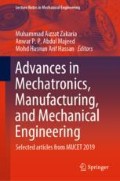Abstract
This paper presents an improvement project in a semiconductor industry to minimize product lead time in automated optical inspection (AOI) operation. The Lean Thinking (LT) approach is applied to drive this improvement project, which it performed based on three main stages; observation, improvement and validation. Initial observation study found a significant cause of this problem (lead time). There have improper record and control mechanisms of receiving the product lots from production department, picking the products lots for inspection and restoring the products lots after inspection. Therefore, this not only cause the high and inconsistent lead time of products lot to be inspect (due to random rack location searching during picking and restoring processes) also the right sequence of product lots from one type to another that went through the AOI operation cannot systematically managed and controlled. In improvement stage, a production control system, namely Kanban-based First-In-First-Out (FIFO) system is proposed to solve the stated problem. Generally, Kanban technique applied in this research project is to systematically guide the inspection operator for performing AOI operation based on FIFO rule. There are two keys rules behind Kanban technique application; First is to record the sequence of the product lots that been received from production department and obtained the rack location for their temporary store. Second is to provide input information for the inspection operator to perform the activities picking and restoring in the right sequence of product lot direct to the rack location that has been stored before. Another technical mechanism included in Kanban-based FIFO system is the application of supermarket buffer system to minimize the wafer lot searching activity. In validation stage, the proposed solution has been tested within the period of one month. Results show that the searching times for picking and restoring the product lots has reduced to 77.0% and overall product lead time due inspection process has reduced 54.2%. The mechanism of Kanban-based FIFO system is then proposed to the top management of the case study company to be embedded with Internet of Thing (IoT) technology to support Industrial 4.0 evolution.
Access this chapter
Tax calculation will be finalised at checkout
Purchases are for personal use only
References
Papadopoulou, T.C., Ozbayrak, M.: Leanness: experiences from the journey to date. J. Manuf. Technol. Manag. 16(7), 784–807 (2005)
Shah, D., Patel, P.: Productivity improvement by implementing lean manufacturing tools in manufacturing industry. Int. Res. J. Eng. Technol. 5(3), 3794–3798 (2018)
Buer, S.-V., Strandhagen, J.O., Chan, F.T.S.: The link between Industry 4.0 and lean manufacturing: mapping current research and establishing a research agenda. Int. J. Prod. Res. 56(8) (2018). https://doi.org/10.1080/00207543.2018.1442945
Henao, R., Sarache, W., Gómez, I.: Lean manufacturing and sustainable performance: trends and future challenges. J. Clean. Prod. 208, 99–116 (2019)
Stone, K.B.: Four decades of lean: a systematic literature review. Int. J. Lean Six Sigma 3(2), 112–132 (2012)
Womack, J.P., Jones, D.T.: Lean thinking banish waste and create wealth in your corporation. Free Press, Simon & Schuster Inc, New York (1996)
Stone, K.B.: Lean transformation: organizational performance factors that influence firms’ leanness. J. Enterp. Transform. 2(4), 229–249 (2012)
Jasti, N.V.K., Kodali, R.: An empirical study for implementation of lean principles in Indian manufacturing industry. Benchmarking Int. J. 23(1), 183–207 (2016). https://doi.org/10.1108/BIJ-11-2013-0101
Junior, M.L., Moacir, G.F.: Variations of the kanban system: literature review and classification. Int. J. Prod. Econ. 125(1), 13–21 (2010)
Ramnath, B.V., Elanchezhian, C., Kesavan, R.: Application of kanban system for implementing lean manufacturing - a case study. J. Eng. Res. Stud., 138–151 (2010)
Rother, M., Shook, J.: Learning to see: value stream mapping to add value and eliminate muda. Lean Enterprise Institute, MIT (2003)
Bevilacqua, M., Ciarapica, F.E., De Sanctis, I., Mazzuto, G., Paciarotti, C.: A Changeover Time Reduction through an integration of lean practices: a case study from pharmaceutical sector. Assembly Autom. 35(1), 22–34 (2015)
Blijleven, V., Koelemeijer, K., Jaspers, M.: Identifying and eliminating inefficiencies in information system usage: Alean perspective. Int. J. Med. Informatics 107, 40–47 (2017)
Ahmad, R., Soberi, M.S.F.: Changeover process improvement based on modified SMED method and other process improvement tools application: an improvement project of 5-axis CNC machine operation in advanced composite manufacturing industry. Int. J. Adv. Manuf. Technol. 94(1–4), 433–450 (2018)
Galankashi, M.R., Helmi, S.A.: Assessment of hybrid Lean-Agile (Leagile) supply chain strategies. J. Manuf. Technol. Manag. 27(4), 470–482 (2016)
Chaple, A.P., Narkhede, B.E.: Value stream mapping in a discrete manufacturing: a case study. Int. J. Supply Chain Manag. 6(1), 55–67 (2017)
Acknowledgement
Authors wishing to acknowledge assistance and encouragement from colleagues from School of Manufacturing Engineering Universiti Malaysia Perlis, also top management and technical staffs of the case study company especially in providing data and related information of the project. Authors wish to thank for the financial support from Universiti Malaysia Perlis in completing this publication. Finally, the authors also thank the referees for their useful suggestions to improve the quality of the article.
Author information
Authors and Affiliations
Corresponding author
Editor information
Editors and Affiliations
Rights and permissions
Copyright information
© 2021 Springer Nature Singapore Pte Ltd.
About this paper
Cite this paper
Krom, P., Ahmad, R., Mustafa, S.A., Sin, T.C. (2021). Implementation of Kanban-Based FIFO System to Minimize Lead Time at Automated Optical Inspection Operation - A Case Study in Semiconductor Industry. In: Zakaria, M., Abdul Majeed, A., Hassan, M. (eds) Advances in Mechatronics, Manufacturing, and Mechanical Engineering. Lecture Notes in Mechanical Engineering. Springer, Singapore. https://doi.org/10.1007/978-981-15-7309-5_10
Download citation
DOI: https://doi.org/10.1007/978-981-15-7309-5_10
Published:
Publisher Name: Springer, Singapore
Print ISBN: 978-981-15-7308-8
Online ISBN: 978-981-15-7309-5
eBook Packages: Intelligent Technologies and RoboticsIntelligent Technologies and Robotics (R0)

